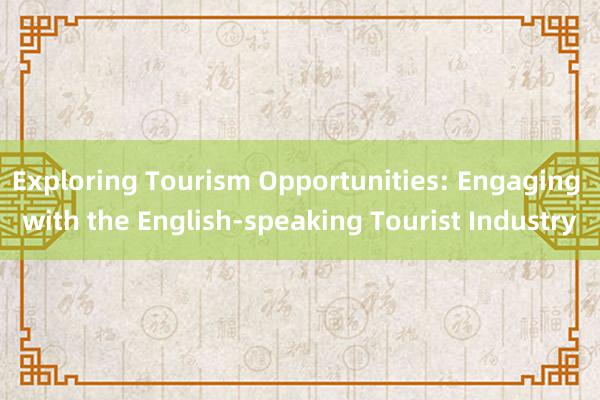
### Exploring Tourism Opportunities: Engaging with the English-speaking Tourist Industry
In today's globalized world, tourism has emerged as a significant economic driver, contributing substantially to job creation, cultural exchange, and economic growth. Given its importance, understanding how to effectively engage with the English-speaking tourist industry is crucial for destinations looking to maximize their tourism potential. This article delves into strategies and insights that can help destinations attract and cater to English-speaking tourists, enhancing their overall travel experience.
#### 1. **Language and Communication**
- **Enhance Language Skills:** Ensuring that tourism staff can communicate effectively in English not only improves customer service but also fosters a welcoming environment. Consider offering language training programs for local staff.
- **Multilingual Signage:** Use clear, concise, and culturally sensitive English signage to guide visitors through attractions and ensure they understand important information.
#### 2. **Cultural Sensitivity and Education**
- **Cultural Workshops and Tours:** Organize workshops or tours that educate tourists about local culture, history, and traditions. This not only enriches their experience but also promotes mutual understanding and respect.
- **Local Cuisine and Art:** Highlight and celebrate local culinary experiences and art forms. Offering English-language guides or descriptions can enhance the appreciation of these elements.
#### 3. **Accessibility and Infrastructure**
我的钓鱼笔记- **Accessible Information:** Ensure that all promotional materials, websites, and apps are accessible in English, 泠泠7弦上网 providing detailed information on accommodations, 首页-九嘉艾颜料有限公司 activities,邯郸吃喝玩乐惠 and services.
- **Facilities Adaptation:** Make necessary adaptations to facilities, such as restrooms, restaurants, and public spaces,深圳艾利达公司 to meet the needs of diverse visitors, including those with disabilities.
#### 4. **Marketing Strategies**
- **Digital Marketing:** Utilize digital platforms like social media, blogs, and video content to reach English-speaking audiences. Tailor marketing messages to highlight unique selling points and authentic experiences.
- **Partnerships and Collaborations:** Partner with English-speaking influencers, bloggers, and travel agencies to promote destinations. These collaborations can significantly increase visibility among target audiences.
#### 5. **Sustainability and Ethical Tourism**
- **Promote Sustainable Practices:** Encourage eco-friendly practices among tourists and local communities. Highlight initiatives like sustainable tourism projects, conservation efforts, and responsible travel practices.
- **Support Local Economies:** Promote local businesses and products, ensuring that tourism benefits the community at large. This can include locally owned accommodations, restaurants, and shops.
#### 6. **Safety and Security**
- **Emergency Services:** Ensure that emergency services and protocols are clearly communicated in English. Provide safety tips and guidelines for tourists to navigate the destination safely.
#### Conclusion
Engaging with the English-speaking tourist industry requires a multifaceted approach that addresses language深圳艾利达公司, culture, accessibility, marketing, sustainability, and safety. By focusing on these areas, destinations can not only attract more English-speaking tourists but also provide them with memorable, enriching experiences that foster a deeper appreciation and respect for the local culture and environment.